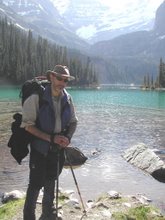I don’t think I remember a summer like this since 1992,
the year I first met Shauna. That summer the weather in the northeast was
atrocious, probably due in part to the eruption of Mt. Pinatubo. My friend Bob
created a mnemonic phrase to remember that summer: “ ‘92, the summer that blew”. Whatever the
cause, that entire summer was characterized by cool fall weather, and very
little sun. I’m not sure what’s going on this summer, but it certainly has been
characterized by significant rainfall. I gauge the rainfall by the number of
times thus far this summer that I’ve had to rescue my little Porta-Bote from
sinking at the dock. My bailing bucket is a full-sized pail, and it seems that at
least once a week, I am emptying five to seven pails full of water out of the
boat. Indeed, today is another one of those days, and as I look down to the
dock, the top of the transom of that little boat is gradually sinking to the waterline.
Rain that comes this hard and fast washes out our driveway, drowns my garden,
and it causes problems I never expected.
When we built this house, we thought we were
over-compensating with our drainage plan. In fact, ours was one of the first
construction projects on this lake which required a full site plan, and we had
to jump through hoops of fire to satisfy the town that our drainage was
sufficient. We have two retention ponds on our property and even put in an
extra tile bed off one side of the house (which was not required) to catch rain
off the roof. Still, we have had flooding on our property and eventually
installed a sump pump at the lowest point in our basement to divert water down to
the lake. We have not had any flooding since we installed that pump, so I think
(hope) we have adjusted to the increasingly frequent deluges.
While we complain about the significant rainfall here
in Ontario, a lack of water is the problem elsewhere, and wildfires rage out in
the West. British Columbia seems to have been particularly hard hit, and the arid
weather and high winds are making it hard to control the over 200 fires now
burning. Last night, I heard on the news that Banff, Alberta, our home away from
home, has now been affected by fires. After that horrible wildfire in Slave
Lake and later Ft. McMurray Alberta, it seems clear that the same conditions
that are making it wetter here are making it drier in the West. I remember
driving out West years ago and encountering a wildfire on the Trans Canada Highway.
It was frightening to see it up close. Once, out in Banff, we saw a controlled
burn near the town center go out of control, lighting up the side of a nearby
mountain. Banff, which sits in the Bow Valley, filled up with acrid smoke for a
day or two, making it hard to breath. Again, it was scary to be that close to
the flames. Many years ago, as we were heading out to a hike in Kootenay Park,
near the Alberta - B.C. border, we could see the smoke from a raging wildfire
rising over the mountains to our west. It’s a fact of life out west.
Clearly, the planet is warming up, and we are reminded
of this fact every time we see the image of a polar bear stranded on a block of
floating ice, or a giant block of ice the size of a city breaking off one of
the poles, or a devastating storm that wipes out an entire community. We see evidence of warming trends at both poles, and Al Gore in all
his hubris implores us to change our ozone-depleting ways. I am no denier of
climate change, but I question the economic feasibility of some of Gore’s
directives. I am reminded of a book my nephew, a meteorologist for the National
Weather Service, had me read. Entitled “Cool It”, and written by economist Bjorn Lomborg, the main theme seems to be that we cannot significantly change the trends of
Mother Nature. The horse has left the barn and he didn’t look before he leapt.
While it would be wise to switch to renewable sources of energy, especially
solar, now that the prices are coming down, the hundreds of billions we spend
to control cyclical weather trends will I think be better spent adapting to
that which we cannot control.
But that will never happen. Shoreline development will
continue unabated, populations will continue to explode, more and more vacant
land will be paved, developing nations will continue to disregard the directives
of the Paris Agreement, and the world will continue to warm up, whether we choose
to drive a Prius or a Hummer. Maybe we buy ourselves a few more decades of
survival by throwing hundreds of billions at the problem, but I’m beginning to
understand that I can’t change Mother Nature. I am reminded of this every day
that I live in the country. I can’t stop the rain, but I can try to adapt to it.
I can pump down our water table so that my property doesn’t flood. I am a
little concerned about the next freak snowstorm.
- Written by Jamie Oppenheimer c 2017 ALL
RIGHTS RESERVED



No comments:
Post a Comment